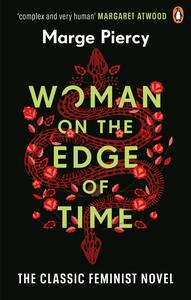Take a photo of a barcode or cover
challenging
dark
emotional
reflective
sad
adventurous
dark
slow-paced
A fascinating combination of dystopian and time travel! I enjoyed it.
reflective
fast-paced
Plot or Character Driven:
Character
Strong character development:
Complicated
Loveable characters:
Complicated
Diverse cast of characters:
Yes
Flaws of characters a main focus:
Yes
Me parece sublime la forma en la que plantea el futuro
challenging
dark
inspiring
reflective
sad
tense
medium-paced
Plot or Character Driven:
Character
Strong character development:
Yes
Loveable characters:
Yes
Diverse cast of characters:
Yes
Flaws of characters a main focus:
No
inspiring
reflective
sad
slow-paced
Plot or Character Driven:
Character
Strong character development:
Yes
Loveable characters:
Yes
Diverse cast of characters:
Yes
Flaws of characters a main focus:
Complicated
This book... blew my mind. It's angry, and demanding, and confronting, and seriously amazing. It's also not at all what I was expecting, but that's quite ok.
Connie Ramos has been committed to a mental institution (again) in the mid-1970s. Perhaps the first time she ought to have been there (although maybe not...), but this time she doesn't. Which doesn't make any difference to the authorities, who view her - as a woman, a previously incarcerated person, as a Chicana, and with powerful male figures banded against her - as unreliable and someone To Be Dealt With. Her experiences within the institution are demeaning and seem aimed at dehumanising her and her experiences. What makes this even more unbearable is the thanks Piercy gives at the start, "to people I cannot thank by name, who risked their jobs to sneak me into places I wanted to enter... the past and present inmates of mental institutions who shared their experiences with me" - her fiction is, then, not fiction at all, but a reflection on reality. And that is heartbreaking, if (tragically) also not surprising. Her experiences within the institution - begging for treatment for injuries, the cold carelessness of the staff - are heightened when a doctor chooses her to be part of an experiment in 'curing' certain mental 'problems' (like aggression - particularly in women - and being gay). This is not an easy read. It is a sobering and worthy one, though.
... but hang on. This doesn't sound like the sort of thing she usually reads! Oh yes. Connie is also in contact with someone from the future (150 years ahead, or so). Luciente first speaks to her and appears in Connie's time, but they then discover that Connie can go through to Luciente's time, and experience what life is like then. Piercy does a wonderful thing with this future society in not making it utopian, tempting though I'm sure that would have been. It is certainly better than the America of Connie's experience - enough food for everyone, a broader understanding and expectation of family and care, no capitalism - but there are problems, such as jealousy and anger, still. And indeed there are aspects which Connie finds quite unacceptable, especially in their broadening of the maternal role, which she sees as women having given up their only claim to power. Here, the idea of family is a negotiated one, and multiple partners take on the role of breastfeeding; someone who is tied too closely to another (as we would expect from life partners) is deemed to have overstepped society's boundaries. Of course, the contrast between Luciente's experiences and Connie's makes Connie's all the harder to read.
Connie is not the easiest character to read. There are times when she was frustrating precisely because she fits so much into the mould that society wants her to fill - I can't fault her for that, but I wasn't even born during the times she is experiencing, so there was of course a part of me that just cried out for her to rebel, please! For your own sake! - which I understand is totally unfair, but nonetheless it was there. Luciente is a slightly easier character to read, even though it's through the lens of Connie and her experiences; she's far closer to what I am used to reading about. This disjunction between the characters, and my reactions to them, was a really interesting aspect - and, I admit, added to the discomfort of reading, which led to its own interrogation.
This is a book which interrogates power on the basis of gender, education, race, and perceived place in society. It shows power as constructed, it shows power to be dangerous, and it shows that power shared is more useful power. It doesn't claim to have all the answers, but it certainly suggests that things could be substantially better. And that today's world has the power to bring about change... or not.
Just read it.
Spoiler
If I tell you there were hints of Justine Larbalestier's Liar, you might get an idea of one of the bits that's demanding and mind-blowing. But only one.Connie Ramos has been committed to a mental institution (again) in the mid-1970s. Perhaps the first time she ought to have been there (although maybe not...), but this time she doesn't. Which doesn't make any difference to the authorities, who view her - as a woman, a previously incarcerated person, as a Chicana, and with powerful male figures banded against her - as unreliable and someone To Be Dealt With. Her experiences within the institution are demeaning and seem aimed at dehumanising her and her experiences. What makes this even more unbearable is the thanks Piercy gives at the start, "to people I cannot thank by name, who risked their jobs to sneak me into places I wanted to enter... the past and present inmates of mental institutions who shared their experiences with me" - her fiction is, then, not fiction at all, but a reflection on reality. And that is heartbreaking, if (tragically) also not surprising. Her experiences within the institution - begging for treatment for injuries, the cold carelessness of the staff - are heightened when a doctor chooses her to be part of an experiment in 'curing' certain mental 'problems' (like aggression - particularly in women - and being gay). This is not an easy read. It is a sobering and worthy one, though.
... but hang on. This doesn't sound like the sort of thing she usually reads! Oh yes. Connie is also in contact with someone from the future (150 years ahead, or so). Luciente first speaks to her and appears in Connie's time, but they then discover that Connie can go through to Luciente's time, and experience what life is like then. Piercy does a wonderful thing with this future society in not making it utopian, tempting though I'm sure that would have been. It is certainly better than the America of Connie's experience - enough food for everyone, a broader understanding and expectation of family and care, no capitalism - but there are problems, such as jealousy and anger, still. And indeed there are aspects which Connie finds quite unacceptable, especially in their broadening of the maternal role, which she sees as women having given up their only claim to power. Here, the idea of family is a negotiated one, and multiple partners take on the role of breastfeeding; someone who is tied too closely to another (as we would expect from life partners) is deemed to have overstepped society's boundaries. Of course, the contrast between Luciente's experiences and Connie's makes Connie's all the harder to read.
Connie is not the easiest character to read. There are times when she was frustrating precisely because she fits so much into the mould that society wants her to fill - I can't fault her for that, but I wasn't even born during the times she is experiencing, so there was of course a part of me that just cried out for her to rebel, please! For your own sake! - which I understand is totally unfair, but nonetheless it was there. Luciente is a slightly easier character to read, even though it's through the lens of Connie and her experiences; she's far closer to what I am used to reading about. This disjunction between the characters, and my reactions to them, was a really interesting aspect - and, I admit, added to the discomfort of reading, which led to its own interrogation.
This is a book which interrogates power on the basis of gender, education, race, and perceived place in society. It shows power as constructed, it shows power to be dangerous, and it shows that power shared is more useful power. It doesn't claim to have all the answers, but it certainly suggests that things could be substantially better. And that today's world has the power to bring about change... or not.
Just read it.
i should probably reread this but I remember really loving this
Fascinating feminist sci fi that digs into the intersections of race, class, and mental health. Piercy wrote this in 1976, and her themes around class disparities in the health care system are as prescient as ever. Who do doctors and law enforcement trust to make decisions for themselves? Which people are viewed as reliable and trustworthy? Who deserves second chances as parents and citizens?
Within the first chapter, the protagonist, Connie, a Latina single mother who has lived in poverty and experienced domestic abuse, is sent to a psychiatric hospital for the second time in her life. We live in her point of view and feel the desperation as she weighs various means of coping with her situation, connecting with her remaining allies on the outside, and planning potential escape routes. When she is reached by representatives from a Utopian future society, it is a welcome escape from her bleak institutionalized life.
World-building is a difficult task. At times Piercy shoehorns far too many details about the workings of the future society into conversations between characters, in a way that makes the dialogue clunky. Still, the effect of toggling between the worlds grows in its intensity as the plot progresses. Connie grows increasingly desperate to "pass" as sane, docile, and agreeable in the institution, just as she learns how fragile the potential utopian future truly is.
Many readers debate whether the utopian and dystopian future worlds that Connie experiences are real or imagined. For me, this logistics matters less. The experience of spending time in her shoes--the desperation of poverty of losing body autonomy and personal agency--was incredibly affecting. It posed so many questions: who are we building these futures for? Who gets the benefit of learning from their mistakes? How can we design a world that is more just and equitable now, particularly given how the humanitarian issues Piercy raised more than 40 years ago are still relevant today.
Within the first chapter, the protagonist, Connie, a Latina single mother who has lived in poverty and experienced domestic abuse, is sent to a psychiatric hospital for the second time in her life. We live in her point of view and feel the desperation as she weighs various means of coping with her situation, connecting with her remaining allies on the outside, and planning potential escape routes. When she is reached by representatives from a Utopian future society, it is a welcome escape from her bleak institutionalized life.
World-building is a difficult task. At times Piercy shoehorns far too many details about the workings of the future society into conversations between characters, in a way that makes the dialogue clunky. Still, the effect of toggling between the worlds grows in its intensity as the plot progresses. Connie grows increasingly desperate to "pass" as sane, docile, and agreeable in the institution, just as she learns how fragile the potential utopian future truly is.
Many readers debate whether the utopian and dystopian future worlds that Connie experiences are real or imagined. For me, this logistics matters less. The experience of spending time in her shoes--the desperation of poverty of losing body autonomy and personal agency--was incredibly affecting. It posed so many questions: who are we building these futures for? Who gets the benefit of learning from their mistakes? How can we design a world that is more just and equitable now, particularly given how the humanitarian issues Piercy raised more than 40 years ago are still relevant today.





